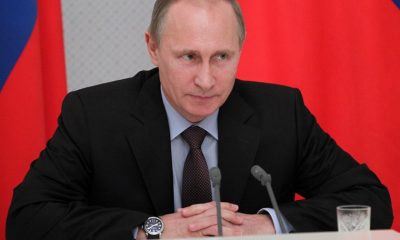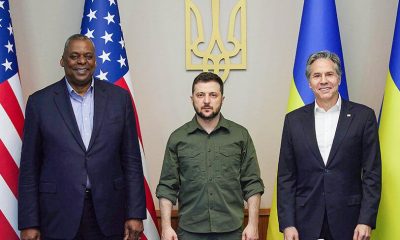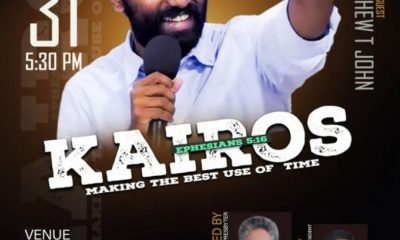us news
The U.S. says Russia will invade Ukraine by mid-February
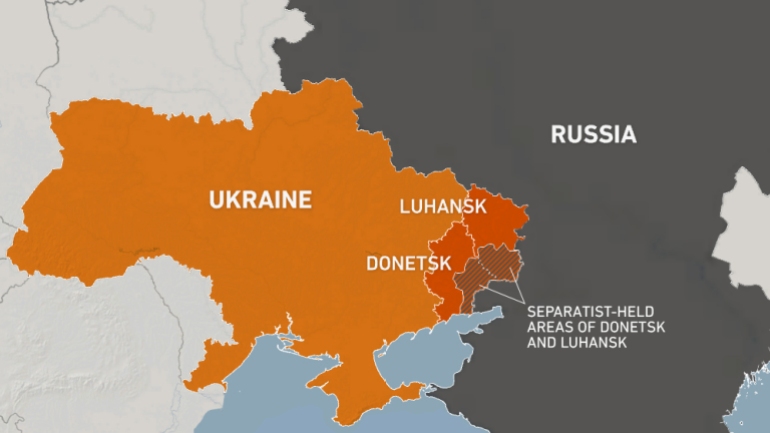
MOSCOW — The White House says President Joe Biden warned Ukraine’s president Thursday that there is a “distinct possibility” Russia could take military action against Ukraine in February. The Kremlin likewise sounded a grim note, saying it saw “little ground for optimism” in resolving the crisis after the U.S. this week again rejected Russia’s main demands.
Russian officials said dialogue was still possible to end the crisis, but Biden again offered a stark warning amid growing concerns that Russian President Vladimir Putin will give the go-ahead for a further invasion of Ukrainian territory in the not-so-distant future.
The White House said Biden’s comments to Ukraine’s Volodymyr Zelenskyy in a phone call amplified concerns that administration officials have been making for some time.
“President Biden said that there is a distinct possibility that the Russians could invade Ukraine in February,” White House National Security Council spokesperson Emily Horne said. “He has said this publicly and we have been warning about this for months. ”
Tensions have soared in recent weeks, as the United States and its NATO allies expressed concern that a buildup of about 100,000 Russian troops near Ukraine signaled that Moscow planned to invade its ex-Soviet neighbor. Russia denies having any such designs — and has laid out a series of demands it says will improve security in Europe.
But as expected, the U.S. and the Western alliance firmly rejected any concessions on Moscow’s main points Wednesday, refusing to permanently ban Ukraine from joining NATO and saying allied deployments of troops and military equipment in Eastern Europe are nonnegotiable.
The U.S. did outline areas in which some of Russia’s concerns might be addressed, possibly offering a path to de-escalation. But, as it has done repeatedly for the past several weeks, Washington also warned Moscow of devastating sanctions if it invades Ukraine. In addition to penalties targeting Russian people and key economic sectors, several senior U.S. officials said Thursday with certainty that Germany would not allow a newly constructed gas pipeline to begin operations in the event of an incursion.
All eyes are now on Putin, who will decide how Russia will respond amid fears that Europe could again be plunged into war.
In the meantime, Biden spoke to his Ukrainian counterpart Zelenskyy on Thursday to reiterate American and allied support, including recent deliveries of U.S. military aid.
Biden warned Zelenskyy that the U.S. believed there was a high degree of likelihood that Russia could invade when the ground freezes and Russian forces could attack Ukrainian territory from north of Kyiv, according to two people familiar with the conversation who were not authorized to comment publicly.
Military experts have said Russia may be waiting for optimal ground conditions to move heavy equipment into Kyiv as part of any invasion. Eight years ago, Russia invaded Ukraine’s Crimean Peninsula in late February.
Zelenskyy tweeted that he and Biden also discussed the possibility of additional financial support for Ukraine.
The White House said Biden told Zelenskyy he was “exploring additional macroeconomic support to help Ukraine’s economy” as it comes under pressure as a result of Russia’s military buildup.
Meanwhile, the United States announced that the U.N. Security Council will hold an open meeting Monday on what U.S. Ambassador Linda Thomas-Greenfield called Russia’s “threatening behavior.” She said the deployment of more than 100,000 troops along Ukraine’s border and other destabilizing acts pose “a clear threat to international peace and security and the U.N. Charter.”
Kremlin spokesman Dmitry Peskov told reporters earlier that the response from the U.S. — and a similar one from NATO — left “little ground for optimism.” But he added that “there always are prospects for continuing a dialogue, it’s in the interests of both us and the Americans.”
White House press secretary Jen Psaki was circumspect when asked whether the Biden administration saw a sliver of hope in that the Russians said they would keep communications open even as they said that they lacked optimism..
“We don’t know if the Russians are playing games on diplomacy. We hope not,” Psaki said.
Foreign Minister Sergey Lavrov said the U.S. response contained some elements that could lead to “the start of a serious talk on secondary issues,” but emphasized that “the document contains no positive response on the main issue.” Those are Moscow’s demands that NATO not expand and that the alliance refrain from deploying weapons that might threaten Russia.
Lavrov said top officials will submit proposals to Putin. Peskov said the Russian reaction would come soon.
The evasive official comments reflect the fact that it is Putin who will single-handedly determine Russia’s next moves. He has warned of unspecified “military-technical measures” if the West refuses to heed the demands.
Peskov added that Putin and Biden will decide whether they need to have another conversation following two calls last month.
Ukraine’s Foreign Minister Dmytro Kuleba said Kyiv had seen the U.S. response before it was delivered to Russia and had no objections. He tweeted it was “important that the U.S. remains in close contact with Ukraine before and after all contacts with Russia.”
On a visit to Denmark, Kuleba emphasized his country’s need to strengthen its defenses.
“This crisis is a moment of truth, and this is why we speak about weapons,” he said. “This is why we speak about economic sanctions. This is why we speak about the consolidated position of all of us, so that President Putin sees that there are no weak links in our defensive chain.”
Germany’s Foreign Minister Annalena Baerbock said during a parliamentary debate on Ukraine that her government is closely coordinating its policy with allies, considering a range of options that could include the new Nord Stream 2 Russian gas pipeline to Germany.
While the diplomacy sputters on, so too do maneuvers that have escalated tensions. Russia has launched a series of military drills involving motorized infantry and artillery units in southwestern Russia, warplanes in Kaliningrad on the Baltic Sea, dozens of warships in the Black Sea and the Arctic, and Russian fighter jets and paratroopers in Belarus.
NATO said it was bolstering its deterrence in the Baltic Sea region, and the U.S. ordered 8,500 troops on higher alert for potential deployment to Europe.
As war fears mounted, thousands of Ukrainians expressed their resolve to stand up to the Russian pressure under the hashtag #UkrainiansWillResist on Twitter and Facebook.
“No one will force Ukrainians to accept the Kremlin ultimatum,” wrote Andrii Levus, who initiated the campaign.
Ukraine’s Interior Ministry has organized training on acting in emergency situations, with an emphasis on dealing with explosives.
Beyond concerns about a possible Russian offensive in Ukraine, there also has been speculation that Moscow’s response could include military deployments to the Western Hemisphere.
While a senior Russian diplomat recently refused to rule out such deployments to Cuba and Venezuela, a top Putin associate expressed skepticism Thursday at that prospect.
“Cuba and Venezuela are aiming to come out of isolation and restore normal relations with the U.S. to a certain extent, so there can’t be any talk about setting up a base there as happened during the Soviet times,” Dmitry Medvedev, a deputy head of Russia’s Security Council, told Russian media.
While he charged that the West is using Ukraine as a way to contain Russia, he somberly acknowledged that a Russia-NATO conflict “would be the most dramatic and simply catastrophic scenario, and I hope it will never happen.”
While concerns about a possible Russian attack linger, a separatist conflict simmers in Ukraine. Following the 2014 ouster of a Kremlin-friendly president in Kyiv, Moscow annexed Ukraine’s Crimean Peninsula and backed an insurgency in the country’s eastern industrial heartland. Fighting between Ukrainian forces and Russia-backed rebels has killed over 14,000 people, and efforts to reach a settlement have stalled.
Since the conflict began, Russia has been accused of sending troops and weapons to the separatists, something it has denied. On Thursday, Peskov wouldn’t comment on a proposal from the Kremlin’s main political party, United Russia, which suggested that Moscow respond to the delivery of Western weapons to Ukraine by sending arms to the rebels. He added that Putin is aware of the proposal but had no immediate reaction.
http://theendtimeradio.com
us news
Man facing 5 years to life in prison after taking weapons to church, threatening to kill worshipers
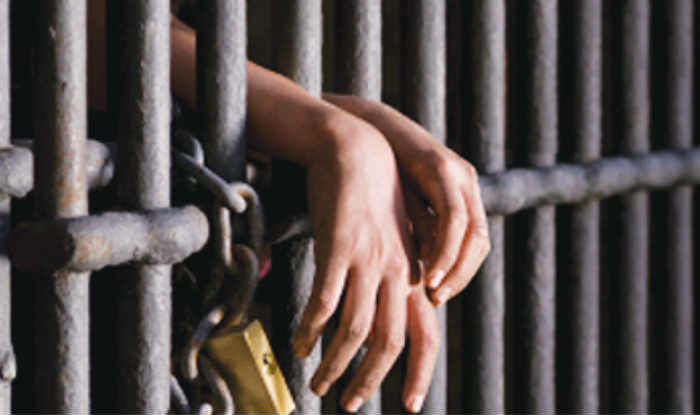
A man who attempted to attack a Virginia church armed with a gun and a couple of knives has been convicted of multiple counts and is facing at least five years in prison, or even life.
A jury found Rui Jiang guilty on Thursday of charges that include attempting to obstruct the congregants of a church in the free exercise of their beliefs, transmitting threats online and a firearms violation.
Jiang faces a mandatory minimum of five years in prison, but could be sentenced to life. A sentencing hearing is scheduled for June 18, according to the United States Department of Justice.
On Sept. 23, 2023, Jiang made multiple threats of violence on social media against Park Valley Church of Falls Church. A Maryland resident saw these posts and alerted authorities.
On the morning of Sept. 24, 2023, a Sunday, an off-duty police officer at the church discovered Jiang’s vehicle on the property, as did other members of the congregation.
Church members detained Jiang until authorities arrived. When arrested, Jiang was found to be carrying a loaded legally purchased handgun, an extra ammunition magazine, and two knives.
In a statement released at the time, Fairfax County police said they and other police departments “acted swiftly” and, as a result, “were able to stop a potential active shooter.”
“Since the arrest, detectives from our Threat Assessment Management Unit have been assigned to assist with the investigation,” local authorities said at the time. “TAM detectives assisted with the execution of a search warrant at Jiang’s home. Evidence supporting Jiang’s intent to cause harm was recovered from the scene.”
In December 2023, the Prince William County Police Department announced that it was adding the charge of attempted aggravated murder to earlier charges of carrying a dangerous weapon to a place of worship and making threats of bodily harm.
“The additional charge against the accused stems from the ongoing investigation and analysis of digital evidence obtained during the search warrant executed at his residence in Falls Church,” authorities stated at the time.
“Based upon the recent analysis of the digital evidence, physical evidence collected at the time, and the social media postings on accounts used by the accused depicting the church with threatening language, indications were the accused intended to cause harm, injury, and death to the church congregation.”
Jiang was indicted in March of 2024, with investigators finding a note that he had written to the families of his potential victims.
“To the families of those men about to be slain — I am sorry for what I have done and about to do. May your tears not be cried in vain, but to celebrate how your loved ones had lived,” read the letter in part, as quoted by authorities.
Authorities also found evidence of anti-religious sentiment, as seen with various social media posts that Jiang had allegedly written before the attempted mass shooting.
Sources:Christian Post
us news
10 reasons beauty is powerful apologetic

In today’s cultural climate, where truth is often subjective, and goodness is increasingly questioned, beauty remains a universal language that transcends barriers. Conservative Jewish and Christian scholars agree that beauty originates from God, who is the ultimate source of all that is good, true, and beautiful. Beauty is not merely aesthetic but a reflection of God’s perfection, order, and glory.
The three conditions of beauty
Thomas Aquinas identifies three key attributes that define beauty:
1. Integrity (a statue with missing limbs would lack integrity and thus lose its beauty.)
2. Proportion (harmony): Beauty depends on the harmony or proper relationship between the parts of a whole. This reflects an ordered and rational structure. (Music is beautiful because of the balance and proportion of its notes.)
3. Clarity (brightness or radiance): Beauty is enhanced by the ability of something to reveal its essence clearly and intelligibly. (A work of art is beautiful when it reveals the truth about the subject it represents.)
God as the source of all beauty
God is supremely beautiful because He is perfect, complete, and the cause of all order and harmony in creation. Aquinas writes, “God is beauty itself” because His essence is pure actuality, free of any deficiency”. All beauty in the created world reflects divine beauty. Just as light emanates from the sun, beauty in creation flows from God as its source.
David said in Psalm 27:4 — “One thing I ask from the Lord … that I may gaze on the beauty of the Lord,” — which shows that God’s beauty is moral, spiritual, and transcendent. His holiness, righteousness, and majesty embody beauty in its purest form. The phrase “worship the Lord in the beauty of holiness” (Psalm 29:2; 96:9) encapsulates the Old Testament’s view of beauty as inseparable from holiness.”
Since the Protestant Reformation, many sectors of the Church have rejected beauty, opting for simplicity out of fear of idolatry. This overreaction has stripped the Church of one of its most compelling apologetics for the Gospel.
Below are ten reasons why embracing beauty is essential for the Church’s mission in the world.
1. Beauty reflects the nature of God
God is the essence of beauty. From the beginning, creation itself testifies to His splendor: “The heavens declare the glory of God; the skies proclaim the work of his hands” (Psalm 19:1). The intricate shapes and multi-varied colors of the cosmos, an awe-inspiring sunset, the majesty of the mountains, and the complexity of the human body all point to a Creator who delights in beauty. When the Church neglects beauty, it neglects a vital aspect of God’s nature. By embracing beauty, we bear witness to the God who encapsulates both the good and the beautiful.
2. Beauty is an act of worship
Far from being idolatrous, the creation of beauty can be an act of worship. In Exodus 35–36, God anointed Bezalel and Oholiab with His Spirit to craft the Tabernacle, filling it with intricate designs, gold, and images of cherubim. These artisans used their skills to glorify God, demonstrating that beauty has a sacred purpose. When the Church embraces beauty in its buildings, music, and creative expressions, it reflects the worship seen in Scripture, where excellence and artistry are offered as gifts to God.
3. The Church is meant to depict Heaven on earth
The Tabernacle and the Temple of Solomon were designed to reflect heavenly realities (Hebrews 8:5). Their beauty pointed to the perfection of God’s throne room and the original harmony of Eden. In the same way, the Church is called to reflect Heaven on earth. Through beautiful art, architecture, and liturgy, we provide a foretaste of God’s kingdom, inspiring people to long for the ultimate restoration of all things.
4. Beauty draws people to God
Beauty is a universal language that transcends culture, time, and religion. While theological arguments and moral debates often divide, beauty has the power to unite.
5. Beauty affirms human dignity as the Image of God
Genesis 1:27 teaches that humanity is made in God’s image. Some theologians suggest this means we are God’s “icons,” called to reflect His glory. We fulfill this divine calling when we create beauty—whether through art, music, or innovation.
6. The rejection of beauty undermines evangelism
When the Church distances itself from beauty, it distances itself from one of God’s most attractive aspects. Many people are drawn to Christianity not through arguments but through the beauty of a cathedral, the majesty of sacred music, or the elegance of a well-crafted liturgy. By embracing beauty, the Church provides a powerful apologetic that appeals to the senses and emotions, drawing people to the Gospel’s truth.
7. Beauty inspires the next generation of cultural creatives
Historically, The Church has patronized the arts, producing some of the world’s greatest artists, composers, and architects. From Michelangelo to Bach, these cultural creatives were inspired by their faith to depict the beauty of God. By prioritizing beauty, the Church can once again raise up a generation of artists, engineers, scientists, and innovators who reflect God’s glory in their work. This enriches culture and serves as a compelling witness to the world.
8. Beauty points to the atonement
Colossians 1:20 states that through Christ, God reconciled all things to Himself. This includes not only humanity but also the entirety of creation. The atonement is not merely about forgiving sins but restoring creation to its original beauty and harmony.
The Old Testament often uses beauty to symbolize redemption and restoration. Isaiah 61:3 speaks of giving “a crown of beauty instead of ashes,” pointing to God’s transformative power
By embracing beauty, the Church participates in this redemptive work, offering a glimpse of the new heavens and new earth where all things will be made beautiful again.
9. Beauty counters the secular narrative
Beauty offers a counter-narrative in a culture dominated by utilitarianism and pragmatism, where value is measured by functionality and profit. Life without God leads to nihilism and hopelessness, as we have seen in the writings of German philosopher Frederick Nietzsche. When the Church embraces beauty, it challenges the secular worldview and invites people to experience a reality that transcends the material.
10. Beauty aligns with the mission of reconciliation
The Christian faith is fundamentally a story of reconciliation — between God and humanity, between individuals, and ultimately between all of creation and its Creator (2 Corinthians 5:18–19). Beauty serves as a signpost of this reconciliation, demonstrating the restoration of order, harmony, and radiance where there was once brokenness.
Beauty acts as a foretaste of the renewed creation in a fractured world marked by division, suffering, and decay. The resurrection of Christ is the ultimate act of restoration, turning the horror of the cross into the beauty of redemption. Just as an artist takes raw, unformed materials and crafts them into something beautiful, God shapes history toward His ultimate beauty of cosmic harmony and perfection.
Sources:Christian Post
us news
യുഎസിൽ ഞായറാഴ്ച ക്ലോക്കുകളിലെ സൂചി ഒരു മണിക്കൂർ മുന്നോട്ട് മാറ്റും

ഡാളസ്: യുഎസിൽ ഞായറാഴ്ച പുലർച്ചെ രണ്ടിന് ക്ലോക്കുകളിലെ സൂചി ഒരു മണിക്കൂർ മുൻപോട്ട് തിരിച്ചുവയ്ക്കും. നവംബർ മൂന്നിനാണ് സമയം ഒരു മണിക്കൂർ പുറകോട്ട് തിരിച്ചുവച്ചത്.
വിന്റർ സീസണിന്റെ അവസാനം ഒരു മണിക്കൂർ മുന്നോട്ടും ഫോൾ സീസണിൽ ഒരു മണിക്കൂർ പുറകോട്ടും തിരിച്ചുവയ്ക്കുന്ന സമയമാറ്റം അമേരിക്കയിൽ ആദ്യമായി നിലവിൽ വന്നത് ഒന്നാം ലോക മഹായുദ്ധം നടന്നിരുന്ന കാലഘട്ടത്തിലാണ്.
സൂര്യപ്രകാശം ധാരാളമായി ലഭിക്കുന്ന സ്പ്രിംഗ്, വിന്റർ സീസണുകളിൽ പകലിന്റെ ദൈർഘ്യം വർധിപ്പിച്ച് വൈദ്യുതി ഉപയോഗം കുറയ്ക്കുന്നതിനും ഇതിൽ നിന്നും ലഭിക്കുന്ന മിച്ച വൈദ്യുതി യുദ്ധമേഖലയിൽ പ്രയോജനപ്പെടുത്തുന്നതിനും ലക്ഷ്യമിട്ടാണ് അമേരിക്കയിൽ സമയമാറ്റം അംഗീകരിച്ച് നടപ്പാക്കി തുടങ്ങിയത്.
സ്പ്രിംഗ് ഫോർവേഡ്, ഫോൾ ബാക്ക്വേഡ് എന്നാണ് ഇവിടെ സമയമാറ്റം അറിയപ്പെടുന്നത്. അരിസോന, ഹവായ്, പുർടോറിക്കൊ, വെർജിൻ ഐലൻഡ് തുടങ്ങിയ പ്രദേശങ്ങളിൽ സമയമാറ്റം ബാധകമല്ല.
Sources:azchavattomonline.com
After approximately four months of observing standard time, clocks will spring forward overnight as the observance of daylight saving time begins in much of the United States.
The change takes place at 2 a.m. Sunday, with most clocks automatically jumping ahead one hour at that time, though some may have to be changed manually, such as freestanding clocks or those on some appliances.
The switch to daylight saving time also leads to later sunsets, and one less hour of sleep Saturday night.
In the U.S., daylight saving time lasts for a total of 34 weeks, typically running from early-to-mid March to the beginning of November in states that observe it. The clocks were last changed Nov. 3, at the end of daylight saving in 2024, when they “fell back” one hour.
With the time change hours away, here’s what to know about daylight saving time, how springing forward could affect your sleep and more.
How daylight saving time impacts sunsets, sunrises
When daylight saving time begins in March each year, clocks “spring forward,” which leads to later sunsets. It also means you’ll lose an hour of sleep.
When daylight saving time comes to an end for 2025 on Nov. 2, the clocks will “fall back,” which means you’ll gain an hour of sleep.
Between early November and early March, much of the U.S. is in standard time. For example, on March 6, the sunrise time in the Chicago area was 6:18 a.m., with the sunset time set for 5:48 p.m.
Sunday, as the clocks move forward into daylight saving time, sunrise will be at 7:11 a.m., and sunset will shift to 6:50 p.m.
According to NBC 5 Meteorologist Kevin Jeanes, the Chicago area gains nearly 1.5 hours of daylight through the month of March.
How daylight saving time impacts sleep
The brain has a master clock that is set by exposure to sunlight and darkness. This circadian rhythm is a roughly 24-hour cycle that determines when we become sleepy and when we’re more alert. The patterns change with age, one reason that early-to-rise youngsters evolve into hard-to-wake teens.
Morning light resets the rhythm. By evening, levels of a hormone called melatonin begin to surge, triggering drowsiness. Too much light in the evening — that extra hour from daylight saving time — delays that surge and the cycle gets out of sync.
Sleep deprivation is linked to heart disease, cognitive decline, obesity and numerous other problems. And that circadian clock affects more than sleep, also influencing things like heart rate, blood pressure, stress hormones and metabolism.
The American Academy of Sleep Medicine, based in Illinois, has called on policymakers to abolish seasonal time changes and instead adopt permanent standard time, which, according to the organization, “follows science and prioritizes public health, safety, and efficiency.”
“The switch to daylight saving time in the spring may seem harmless, but the reality is far more complicated,” Jay Pea, co-chair of the coalition and president of Save Standard Time, said in an article from the AASM. “It disrupts our body clocks, affects our sleep quality, and increases the risk of avoidable health and safety incidents, such as motor vehicle accidents, cardiovascular events, and even workplace errors in the days following the time change. Adopting permanent standard time, on the other hand, offers a better solution for year-round well-being.”
What’s the difference between standard time and daylight saving time?
As it stands, Illinois shifts between the two. “Spring forward” is when the state enters daylight saving time, and the “fall back” marks a return to standard time.
According to the website Time and Date, standard time is the local time in a country or region when daylight saving time is not in use.
“More than 60% of the countries in the world use standard time all year,” the site says. “The remaining countries use DST during the summer months, generally setting clocks forward one hour from standard time.”
According to the AASM, standard time “aligns more closely with our body’s natural circadian rhythms.”
“It offers more sunlight in the morning, helping people wake up and feel more alert, while the evenings gradually become dark earlier, signaling to our bodies that it’s time to wind down,” the AASM said. “This natural alignment supports more restful and consistent sleep.”
When daylight saving time is in effect, however, evening light exposure is prolonged, the AASM says, “which can delay bedtime and disrupt sleep patterns.”
“The increased morning darkness, particularly in winter if daylight saving time were permanent, would create additional challenges, such as unsafe conditions for commuters and children heading to school,” the article stated.
Why was daylight saving time created?
Daylight savings time was first instated in the U.S. more than a century ago, though some people credit its invention to an essay written by Benjamin Franklin in 1784.
In an essay about saving candles, Franklin wrote “Early to bed, early to rise makes a man healthy, wealthy and wise.” But that was meant more as satire than a serious consideration.
Germany was the first to adopt daylight saving time on May 1, 1916, during World War I as a way to conserve fuel. The rest of Europe followed soon after.
Two years later, the U.S. adopted daylight saving time in March of 1918, with the intention of adding additional daylight hours also as a way to help save energy costs during World War I, according to the U.S. Department of Defense. However, it was unpopular and abolished after World War I.
On Feb. 9, 1942, Franklin Roosevelt instituted a year-round daylight saving time, which he called “wartime.” The law, was again meant to instate daylight saving time to “help conserve fuel and promote national security defense,” the department said. This lasted until Sept. 30, 1945.
Daylight saving time didn’t become standard in the U.S. until the passage of the Uniform Time Act of 1966, which mandated standard time across the country within established time zones. It stated that clocks would advance one hour at 2 a.m. on the last Sunday in April and turn back one hour at 2 a.m. on the last Sunday in October.
The standard schedule for daylight saving changed in 2005, thanks in part to the Halloween. Under the conditions of the Energy Policy Act of 2005, daylight saving time starts on the second Sunday in March and ends on the first Sunday in November – a change put in place in part to allow children to trick-or-treat in more daylight.
Which states don’t observe daylight saving time?
Nearly every U.S. state observes daylight saving time, with the exceptions of Arizona (although some Native American tribes do observe DST in their territories) and Hawaii. U.S. territories, including Puerto Rico, American Samoa, Guam and the U.S. Virgin Islands, do not observe daylight saving time.
How to prepare your body to ‘spring forward’
The AASM encourages everyone to take the following steps to minimize the disruption:
Get at least seven hours of sleep per night before and after the time change. Maintaining a consistent sleep routine is crucial.
Adjust the timing of daily routines that are “time cues” for your body, such as your mealtimes or exercise schedule.
Set offline clocks ahead one hour on the evening of Saturday, March 8, and go to bed at your usual time. Online clocks will adjust automatically at 2 a.m. on Sunday, March 9.
Head outdoors for early morning sunlight the week after the time change, as the bright light will help set your internal clock to the new time. This helps regulate sleep and alertness.
http://theendtimeradio.com
-

 Travel10 months ago
Travel10 months agoയാക്കൂസ കരിഷ്മ:ഓല സ്കൂട്ടറിനേക്കാൾ വിലക്കുറവിൽ കുഞ്ഞൻ കാർ; സിറ്റി യാത്രകൾക്ക് ഇനി ഇവൻ മതിയാവും
-

 Movie4 months ago
Movie4 months agoFor KING + COUNTRY Stars’ Big Plan to Bring Message of Jesus, ‘Redemption of Humanity’ to People Across America
-

 Tech8 months ago
Tech8 months agoചിത്രങ്ങൾ എഡിറ്റ് ചെയ്യാം; വാട്സ്ആപ്പിലെ ‘നീല വളയം’ സ്മാർട്ടാകുന്നു, കാര്യമായ മാറ്റങ്ങൾ
-

 Movie4 months ago
Movie4 months agoFor KING + COUNTRY Stars’ Big Plan to Bring Message of Jesus, ‘Redemption of Humanity’ to People Across America
-
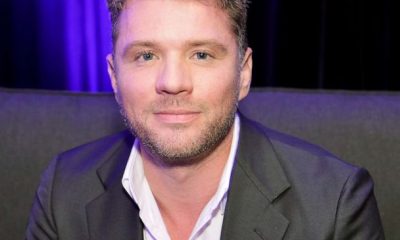
 Movie12 months ago
Movie12 months agoActor Ryan Phillippe ‘Craving’ Relationship With God After Movie About Christian Missionary
-

 Articles9 months ago
Articles9 months ago8 ways the Kingdom connects us back to the Garden of Eden
-

 world news3 weeks ago
world news3 weeks agoമ്യാന്മറില് സായുധസംഘത്തിന്റെ വെടിയേറ്റ് കത്തോലിക്ക വൈദികന് കൊല്ലപ്പെട്ടു.
-

 Hot News11 months ago
Hot News11 months ago3 key evidences of Jesus’ return from the grave







